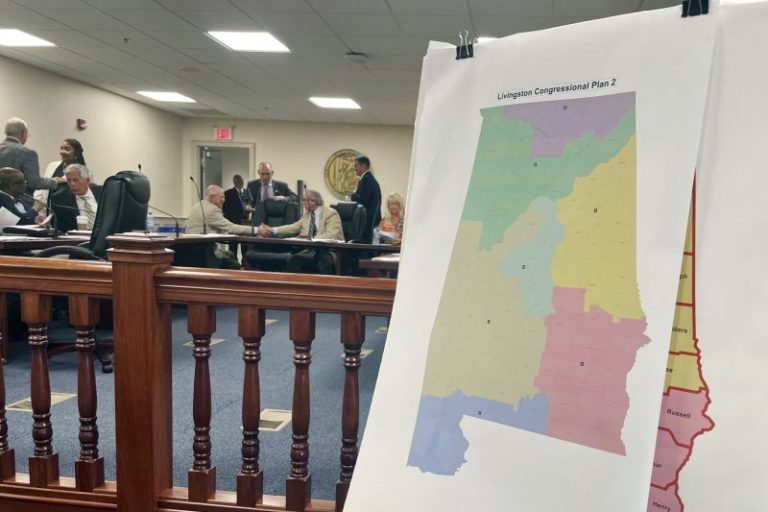The Republican-led House and Senate in Alabama approved dueling congressional maps Wednesday that would increase the percentage of Black voters in the state’s 2nd District — but not by enough, Democrats argued, to comply with a federal court order to create two districts in the state with at least close to a majority-Black population.
The legislature is in special session this week following a Supreme Court opinion in June that found lawmakers previously drew districts that unlawfully dilute the political power of its Black residents in violation of the Voting Rights Act. While Black people make up about 27 percent of Alabama’s population, only one of the state’s seven districts is currently majority-Black.
The unanimous three-judge panel of the federal court, which includes two appointees of former president Donald Trump, has given the legislature until Friday to come up with a new map. The two chambers will need to reconcile their plans to meet that deadline.
The Supreme Court last month upheld the lower court’s order that Alabama needs to redraw the congressional map so it includes two districts in which “Black voters either comprise a voting-age majority or something quite close to it.” The debate this week has in essence focused on the definition of “something quite close to it.” The House bill, which passed 74-27, would increase the representation of Black voters in the 2nd District from about 30 percent to 42 percent, while the Senate bill would increase it to about 38 percent. The Senate bill passed 24-8.
“This is really a slap in the face not only to Black Alabamians but to the Supreme Court,” Rep. Barbara Drummond (D) said during floor debate Wednesday in which Democrats argued the map fell well short of the district court order upheld by the Supreme Court.
Earlier, Rep. Chris Pringle (R), the sponsor of the House map under consideration, said that he believes “in my heart of hearts” that it complies with the Voting Rights Act and would create a 2nd District that could be won by either party.
National voting rights advocates also harshly criticized Alabama’s Republican lawmakers.
“[N]either the House nor the Senate’s proposed congressional maps come anywhere close to achieving” what the court ordered, Marina Jenkins, executive director of the National Redistricting Foundation, said in a statement. The foundation supported the court challenge to the Alabama map.
Jenkins said the legislature’s actions were “a continuation of the state’s long, sordid history of disenfranchising Black voters” and vowed that if either the House or the Senate plan were enacted, it would be challenged in court.
It’s also possible that the three-judge panel could reject a map that passes the legislature and draw its own plan if it decides that lawmakers did not comply with the order. Several Democrats predicted Wednesday that seemed the most probable outcome.
Richard H. Pildes, a constitutional law professor at New York University, said the judges would apply a sophisticated test to determine whether a new map facilitates an “equal opportunity” for Black voters to elect “a candidate of choice.”
“It’s not like a court is going to just eyeball this,” he said. “It’s quite data-driven.”
Pildes said he suspects it would be “a hard case to make” that the maps under consideration comply with the order. If the court decides whichever map is approved doesn’t meet muster, he said he expects the court would move rapidly to appoint a special master to draw a new one.
The three-judge panel wrote, in its 2022 ruling that found Alabama had violated the Voting Rights Act, that “the appropriate remedy is a congressional redistricting plan that includes either an additional majority-Black congressional district, or an additional district in which Black voters otherwise have an opportunity to elect a representative of their choice.”
On Tuesday, Republican-led committees of the Alabama legislature voted down proposals put forward by Democrats that included two majority-Black districts, deciding instead to proceed with the GOP plans.
Greg Reed, the Republican leader of the Senate, told reporters Tuesday that lawyers had advised him that the Senate plan complies with the court order. But he conceded: “There’s going to be certainly more debate.”
Some analysts have speculated that Republicans would rather have a court impose a plan with an additional Black-majority district than have the creation of one on their voting record.
Kareem Crayton, a redistricting expert at the Brennan Center for Justice at New York University School of Law, said he suspects that is true in some cases, suggesting that “there are probably some people who view it as political suicide to comply with the law.”
But kicking the issue to a special master also creates great uncertainty, particularly for Republicans in the Alabama congressional delegation, who want to know in which district they will run next year, he said.
Crayton, an Alabama native, cited another factor he sees at play with lawmakers in the state.
“This is a group that has a long tradition of defying court orders,” he said.

